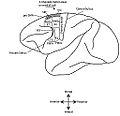Motor cortex
Motor Cortex
The Motor Cortex is a region of the cerebral cortex involved in the planning, control, and execution of voluntary movements. It is located in the posterior part of the frontal lobe.
Anatomy[edit]
The motor cortex can be divided into three areas:
1. The primary motor cortex (M1) 2. The premotor cortex (PMC) 3. The supplementary motor area (SMA)
Each of these areas plays a unique role in motor function.
Primary Motor Cortex[edit]
The primary motor cortex, or M1, is located in the precentral gyrus, and is the main contributor to generating neural impulses that pass down to the spinal cord and control the execution of movement.
Premotor Cortex[edit]
The premotor cortex, or PMC, is involved in planning and executing movements. It is located anterior to the primary motor cortex.
Supplementary Motor Area[edit]
The supplementary motor area, or SMA, is involved in the planning and coordination of complex movements. It is located on the midline surface of the hemisphere, anterior to the primary motor cortex.
Function[edit]
The motor cortex is involved in the planning, control, and execution of voluntary movements. More specifically, the primary motor cortex is responsible for the direct control of voluntary movement, while the premotor and supplementary motor areas are involved in the planning and coordination of movements.
Clinical Significance[edit]
Damage to the motor cortex can result in a variety of motor disorders, including paralysis, apraxia, and motor neurone disease. In addition, the motor cortex is often a target for neurorehabilitation following a stroke or brain injury.
See Also[edit]
References[edit]
<references />
Ad. Transform your life with W8MD's Budget GLP-1 injections from $75


W8MD offers a medical weight loss program to lose weight in Philadelphia. Our physician-supervised medical weight loss provides:
- Weight loss injections in NYC (generic and brand names):
- Zepbound / Mounjaro, Wegovy / Ozempic, Saxenda
- Most insurances accepted or discounted self-pay rates. We will obtain insurance prior authorizations if needed.
- Generic GLP1 weight loss injections from $75 for the starting dose.
- Also offer prescription weight loss medications including Phentermine, Qsymia, Diethylpropion, Contrave etc.
NYC weight loss doctor appointmentsNYC weight loss doctor appointments
Start your NYC weight loss journey today at our NYC medical weight loss and Philadelphia medical weight loss clinics.
- Call 718-946-5500 to lose weight in NYC or for medical weight loss in Philadelphia 215-676-2334.
- Tags:NYC medical weight loss, Philadelphia lose weight Zepbound NYC, Budget GLP1 weight loss injections, Wegovy Philadelphia, Wegovy NYC, Philadelphia medical weight loss, Brookly weight loss and Wegovy NYC
|
WikiMD's Wellness Encyclopedia |
| Let Food Be Thy Medicine Medicine Thy Food - Hippocrates |
Medical Disclaimer: WikiMD is not a substitute for professional medical advice. The information on WikiMD is provided as an information resource only, may be incorrect, outdated or misleading, and is not to be used or relied on for any diagnostic or treatment purposes. Please consult your health care provider before making any healthcare decisions or for guidance about a specific medical condition. WikiMD expressly disclaims responsibility, and shall have no liability, for any damages, loss, injury, or liability whatsoever suffered as a result of your reliance on the information contained in this site. By visiting this site you agree to the foregoing terms and conditions, which may from time to time be changed or supplemented by WikiMD. If you do not agree to the foregoing terms and conditions, you should not enter or use this site. See full disclaimer.
Credits:Most images are courtesy of Wikimedia commons, and templates, categories Wikipedia, licensed under CC BY SA or similar.
Translate this page: - East Asian
中文,
日本,
한국어,
South Asian
हिन्दी,
தமிழ்,
తెలుగు,
Urdu,
ಕನ್ನಡ,
Southeast Asian
Indonesian,
Vietnamese,
Thai,
မြန်မာဘာသာ,
বাংলা
European
español,
Deutsch,
français,
Greek,
português do Brasil,
polski,
română,
русский,
Nederlands,
norsk,
svenska,
suomi,
Italian
Middle Eastern & African
عربى,
Turkish,
Persian,
Hebrew,
Afrikaans,
isiZulu,
Kiswahili,
Other
Bulgarian,
Hungarian,
Czech,
Swedish,
മലയാളം,
मराठी,
ਪੰਜਾਬੀ,
ગુજરાતી,
Portuguese,
Ukrainian








